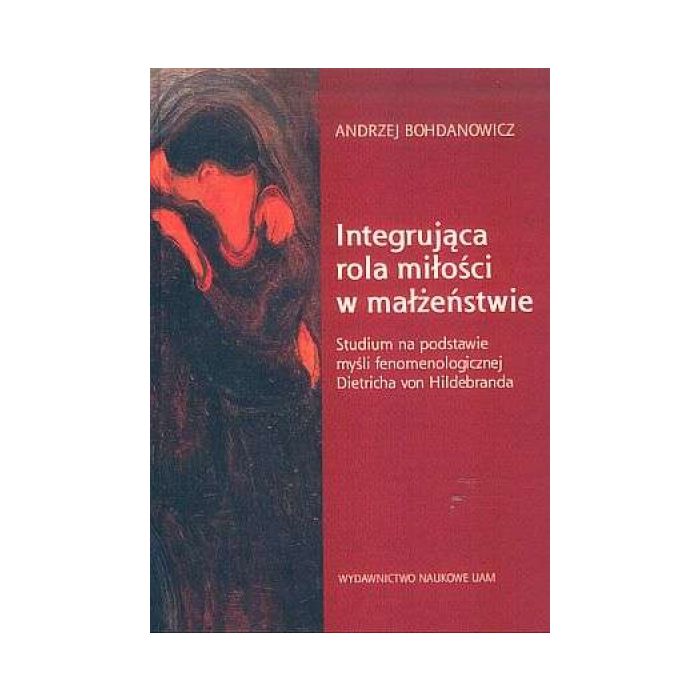Integrująca rola miłości w małżeństwie. Studium na podstawie myśli fenomenologicznej Dietricha von Hildebranda
In his book entitled The Integrative Role of Love in Marriage. A Study Based on the Phenomenological Thought of Dietrich Von Hildebrand the author presents an in-depth analysis of conjugallove and marriage - the ultimate I-Thou-Communion with Christ. According to Hildebrand, married love is much more than merely the satisfaction of human desire or sexual instincts - it unites spouses and is the core of marriage. Its essential characteristics are a basic orientation toward achieving a true union of hearts with the beloved (intentio unionis) and the desire for doing good, a yeaming to make the other person happy (intentio benevolentiae). By making references to numerous books by von Hildebrand, one of the greatest philosophers and spiritual writers of modem times, the author explains the grandeur of spousallove as manifested in a full, mutual self-donation of the spouses within the bodily union, which, in a mysterious way, can lead to the creation of a new human person. Von Hildebrand's utterly positive understanding oft love and sex, which illuminates the great virtue of purity and the greatness ot marriage as a community oft love, remains avant-garde. Yet, his idyl1ic descriptions of love give Catholic spouses a clear sense of direction toward marital holiness and personal fulfillment.
- Wstęp
1. Rola założeń aksjologicznych etyki Hildebranda w uchwyceniu fenomenu miłości- 1.1. Założenia teoriopoznawcze
- 1.1.1. Intuicyjny i intencjonalny charakter poznania filozoficznego
- 1.1.2. Poznanie aprioryczne i jego rola w fenomenologii Hildebranda
- 1.2. Kategorie doniosłości
- 1.2.1. To, co samo w sobie wartościowe (das objektiv Bedeutsame)
- 1.2.2. To, co subiektywnie zadowalające (das subjektiv Befriedigende)
- 1.2.3. To, co obiektywnie dobre dla osoby (objektive Giiter)
- 1.1. Założenia teoriopoznawcze
- 2. Adekwatna odpowiedź na wartość w małżeńskiej relacji mężczyzny i kobiety
- 2.1. Warunki adekwatnej odpowiedzi na wartość
- 2.2. Rola rozumu, woli i serca w odpowiedzi na wartość
- 2.3. Miłość jako najwłaściwsza odpowiedź małżonków na wartość
- 3. Rozwój miłości małżeńskiej na płaszczyźnie naturalnej
- 3.1. Fizyczne i duchowe podstawy rodzenia się miłości
- 3.2. Miłość małżeńska podstawą wspólnoty "Ja - Ty"
- 3.3. Akt zawarcia związku małżeńskiego
- 4. Wyniesienie miłości małżeńskiej na płaszczyźnie nadprzyrodzonej
- 4.1. Sakramentalne przeobrażenie miłości małżeńskiej
- 4.2. Intymna więź małżonków z Chrystusem drogą ich uświęcenia
- 4.3. Dynamika miłości małżeńskiej
- 5. Wartość miłości w życiu wspólnoty małżeńskiej
- 5.1. Miłość fundamentem zjednoczenia wymiaru zmysłowego z duchowym
- 5.1.1. Aktywność seksualna małżonków wyrazem ich milości
- 5.1.2. Aspekt jednoczący aktu małżeńskiego
- 5.1.3. Miłość małżeńska a prokreacja
- 5.2. Miłość małżeńska skierowana ku dobru całej osoby
- 5.2.1. Pragnienie zjednoczenia z osobą kochaną (intentio unionis)
- 5.2.2. Pragnienie obdarowania osoby kochanej (intentio benevolentiae)
- 5.2.3. Miłość małżeńska jako komunia
- 5.3. Miłość podstawą trwałej więzi małżeńskiej
- 5.3.1. Darowanie siebie owocem miłości
- 5.3.2. Wierność małżeńska i nierozerwalność małżeństwa
- 5.3.3. Starość i wdowieństwo
- 5.1. Miłość fundamentem zjednoczenia wymiaru zmysłowego z duchowym
- 6. Miłość małżeńska jako zadanie
- 6.1. Stała gotowość małżonków do przemiany
- 6.2. Troska o czystość
- 6.3. Ochrona i pielęgnowanie miłości - mistyka codzienności
- 7. Próba oceny koncepcji miłości małżeńskiej w ujęciu Dietricha von Hildebranda
- 7.1. Miłość małżeńska według Dietricha von Hildebranda na tle przedsoborowej nauki teologów katolickich i Magisterium Kościoła
- 7.2. Unifikująca koncepcja miłości według Hildebranda w nauce Gaudium et spes i posoborowej doktrynie Kościoła
- 7.3. Miłość małżeńska jako zjednoczenie na płaszczyźnie serc, ducha i ciała
- 7.4. Ujęcie miłości w kategorii wartości i daru
- 7.5. Ponadprokreacyjna wartość i znaczenie małżeństwa
- 7.6. Otwarcie miłości małżeńskiej na Transcendencję
Zakończenie
Bibliografia
The Integrative Role of Love in Marriage. A Study Based on the Phenomenological Thought of Dietrich von Hildebrand (Summary)
| Detailed information | |
|---|---|
| Publication Version | printed |
| Format | 17,0 x 24,0 |
| Title (EN) | The Integrative Role of Love in Marriage. A Study Based on the Phenomenological Thought ot Dietrich von Hildebrand |
| Type of publication | Monografia |
| Edition | I |
| Series | Nauki Teologiczne nr 6 |
| ISSN | 1731-0903 |
| ISBN | 83-232-1715-7 |
| Number of pages | 254 |
| Number of publishing sheets | 21,00 |
| Type of binding | hardcover |
